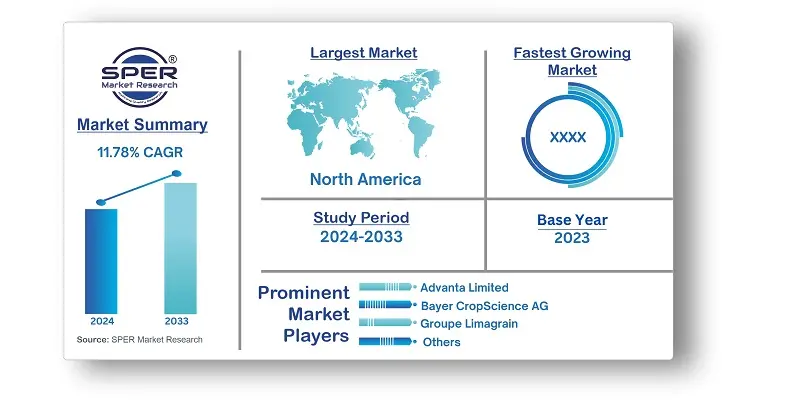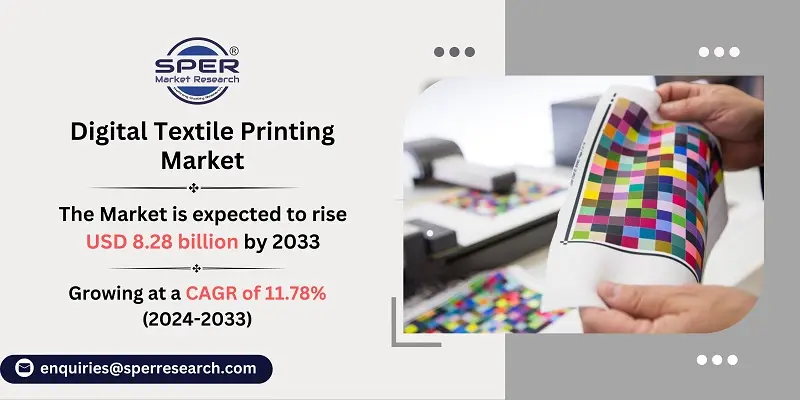
Digital Textile Printing Market Growth, Size, Trends, Demand, Share, Revenue and Future Outlook
Digital Textile Printing Market Size- By Printing Process, By Ink, By Substrate, By End User- Regional Outlook, Competitive Strategies and Segment Forecast to 2033
| Published: Apr-2024 | Report ID: CHEM2438 | Pages: 1 - 244 | Formats*: |
| Category : Chemical & Materials | |||
- August 2022; Roland Digital Group Thailand Ltd, a Samutsakhon-based company that manufactures and supplies inkjet printers for signage and advertising as well as equipment for 3D manufacturing, has announced that it is expanding its services by building a new facility at its Thailand factory.
- June 2022; A new model in its portfolio for digital textile printing, the Texart XT-640S-DTG printer was revealed by Roland DG. With the printer's combination of dye-sublimation and direct-to-garment (DTG) printing capabilities, users may print intricate designs and vivid colors on a range of materials.
- February 2022; Seiko Epson announced the Monna Lisa 8000 printer, a direct-to-fabric printer designed exclusively for North America. Epson has been able to fortify its position in North America and handle the full textile printing process from beginning to end with the acquisition of For.Tex and F.lli Robustelli.
- April 2022; With the Kornit Avalanche Poly Pro Plus, Kornit Digital has unveiled a state-of-the-art digital textile printing system that allows direct-to-fabric printing on polyester-based fabrics. Better color fastness and durability are provided by the technology for applications in sportswear and athleisure.


| Report Metric | Details |
| Market size available for years | 2020-2033 |
| Base year considered | 2023 |
| Forecast period | 2024-2033 |
| Segments covered | By Printing Process, By Ink, By Substrate, By End Use |
| Regions covered | North America, Asia-Pacific, Latin America, Middle East & Africa and Europe |
| Companies Covered | Brother Industries, D. Gen, Dover Corporation, Dupont, Konica Minolta, Kornit Digital, Mimaki Engineering, Robustelli, RolandDG Corporation, Seiko Epson, SPGPrints, Others |
- Suppliers of digital printers
- Manufacturers of different components such as inks, printer peripherals, and so on
- End users of printers such as printing service providers and presses
- Investors (Private Equity, Venture Capital, and Others)
- Component suppliers
- Original equipment manufacturers (OEMs)
- Component and device suppliers and distributors
- Government bodies such as regulatory authorities and policymakers
- Research institutes and organizations
- Market research and consulting firms
| By Printing Process: | |
| By Ink: | |
| By Substrate: | |
| By End Use: |
- Global Digital Textile Printing Market Size (FY’2024-FY’2033)
- Overview of Global Digital Textile Printing Market
- Segmentation of Global Digital Textile Printing Market By Printing Process (Direct To Garment, Dye Sublimation, Direct To Fabric)
- Segmentation of Global Digital Textile Printing Market By Ink (Sublimation, Reactive, Acid, Direct Disperse, Pigment)
- Segmentation of Global Digital Textile Printing Market By Substrate (Digital Cotton Printing, Digital Silk Printing, Digital Rayon Printing, Digital Linen Printing, Digital Polyester Printing, Others)
- Segmentation of Global Digital Textile Printing Market By End Use (Clothing, Households, Displays, Technical Textiles)
- Statistical Snap of Global Digital Textile Printing Market
- Expansion Analysis of Global Digital Textile Printing Market
- Problems and Obstacles in Global Digital Textile Printing Market
- Competitive Landscape in the Global Digital Textile Printing Market
- Impact of COVID-19 and Demonetization on Global Digital Textile Printing Market
- Details on Current Investment in Global Digital Textile Printing Market
- Competitive Analysis of Global Digital Textile Printing Market
- Prominent Players in the Global Digital Textile Printing Market
- SWOT Analysis of Global Digital Textile Printing Market
- Global Digital Textile Printing Market Future Outlook and Projections (FY’2024-FY’2033)
- Recommendations from Analyst
1.1. Scope of the report1.2. Market segment analysis
2.1. Research data source2.1.1. Secondary Data2.1.2. Primary Data2.1.3. SPER’s internal database2.1.4. Premium insight from KOL’s2.2. Market size estimation2.2.1. Top-down and Bottom-up approach2.3. Data triangulation
4.1. Driver, Restraint, Opportunity and Challenges analysis4.1.1. Drivers4.1.2. Restraints4.1.3. Opportunities4.1.4. Challenges4.2. COVID-19 Impacts of the Global Digital Textile Printing Market
5.1. SWOT Analysis5.1.1. Strengths5.1.2. Weaknesses5.1.3. Opportunities5.1.4. Threats5.2. PESTEL Analysis5.2.1. Political Landscape5.2.2. Economic Landscape5.2.3. Social Landscape5.2.4. Technological Landscape5.2.5. Environmental Landscape5.2.6. Legal Landscape5.3. PORTER’s Five Forces5.3.1. Bargaining power of suppliers5.3.2. Bargaining power of buyers5.3.3. Threat of Substitute5.3.4. Threat of new entrant5.3.5. Competitive rivalry5.4. Heat Map Analysis
6.1. Global Digital Textile Printing Market Manufacturing Base Distribution, Sales Area, Product Type6.2. Mergers & Acquisitions, Partnerships, Product Launch, and Collaboration in Global Digital Textile Printing Market
7.1. Global Digital Textile Printing Market Size, Share and Forecast, By Printing Process, 2020-20267.2. Global Digital Textile Printing Market Size, Share and Forecast, By Printing Process, 2027-20337.3. Direct To Garment Services7.4. Dye Sublimation7.5. Direct To Fabric
8.1. Global Digital Textile Printing Market Size, Share and Forecast, By Ink, 2020-20268.2. Global Digital Textile Printing Market Size, Share and Forecast, By Ink, 2027-20338.3. Sublimation8.4. Reactive Acid8.5. Direct Disperse8.6. Pigment
9.1. Global Digital Textile Printing Market Size, Share and Forecast, By Substrate, 2020-20269.2. Global Digital Textile Printing Market Size, Share and Forecast, By Substrate, 2027-20339.3. Digital Cotton Printing9.4. Digital Silk Printing9.5. Digital Rayon Printing9.6. Digital Linen Printing9.7. Digital Polyester Printing9.8. Others
10.1. Global Digital Textile Printing Market Size, Share and Forecast, By End Use, 2020-202610.2. Global Digital Textile Printing Market Size, Share and Forecast, By End Use, 2027-203310.3. Clothing10.4. Households10.5. Displays10.6. Technical Textiles
11.1. Global Digital Textile Printing Market Size and Market Share
12.1. Global Digital Textile Printing Market Size and Market Share By Region (2020-2026)12.2. Global Digital Textile Printing Market Size and Market Share By Region (2027-2033)12.3. Asia-Pacific12.3.1. Australia12.3.2. China12.3.3. India12.3.4. Japan12.3.5. South Korea12.3.6. Rest of Asia-Pacific12.4. Europe12.4.1. France12.4.2. Germany12.4.3. Italy12.4.4. Spain12.4.5. United Kingdom12.4.6. Rest of Europe12.5. Middle East and Africa12.5.1. Kingdom of Saudi Arabia12.5.2. United Arab Emirates12.5.3. Qatar12.5.4. South Africa12.5.5. Egypt12.5.6. Morocco12.5.7. Nigeria12.5.8. Rest of Middle-East and Africa
12.6. North America
12.6.1. Canada12.6.2. Mexico12.6.3. United States12.7. Latin America12.7.1. Argentina12.7.2. Brazil12.7.3. Rest of Latin America
13.1. Brother Industries13.1.1. Company details13.1.2. Financial outlook13.1.3. Product summary13.1.4. Recent developments13.2. D. Gen13.2.1. Company details13.2.2. Financial outlook13.2.3. Product summary13.2.4. Recent developments13.3. Dover Corporation13.3.1. Company details13.3.2. Financial outlook13.3.3. Product summary13.3.4. Recent developments
13.4. Konica Minolta
13.4.1. Company details13.4.2. Financial outlook13.4.3. Product summary13.4.4. Recent developments13.5. Kornit Digital13.5.1. Company details13.5.2. Financial outlook13.5.3. Product summary13.5.4. Recent developments13.6. Mimaki Engineering13.6.1. Company details13.6.2. Financial outlook13.6.3. Product summary13.6.4. Recent developments
13.7. Robustelli
13.7.1. Company details13.7.2. Financial outlook13.7.3. Product summary13.7.4. Recent developments13.8. RolandDG Corporation13.8.1. Company details13.8.2. Financial outlook13.8.3. Product summary13.8.4. Recent developments
13.9. Seiko Epson
13.9.1. Company details13.9.2. Financial outlook13.9.3. Product summary13.9.4. Recent developments
13.10. SPGPrints
13.10.1. Company details13.10.2. Financial outlook13.10.3. Product summary13.10.4. Recent developments13.11. Others
SPER Market Research’s methodology uses great emphasis on primary research to ensure that the market intelligence insights are up to date, reliable and accurate. Primary interviews are done with players involved in each phase of a supply chain to analyze the market forecasting. The secondary research method is used to help you fully understand how the future markets and the spending patterns look likes.
The report is based on in-depth qualitative and quantitative analysis of the Product Market. The quantitative analysis involves the application of various projection and sampling techniques. The qualitative analysis involves primary interviews, surveys, and vendor briefings. The data gathered as a result of these processes are validated through experts opinion. Our research methodology entails an ideal mixture of primary and secondary initiatives.



Frequently Asked Questions About This Report
PLACE AN ORDER
Year End Discount
Sample Report
Pre-Purchase Inquiry
NEED CUSTOMIZATION?
Request CustomizationCALL OR EMAIL US
100% Secure Payment






Related Reports
Our Global Clients
Our data-driven insights have influenced the strategy of 200+ reputed companies across the globe.






















